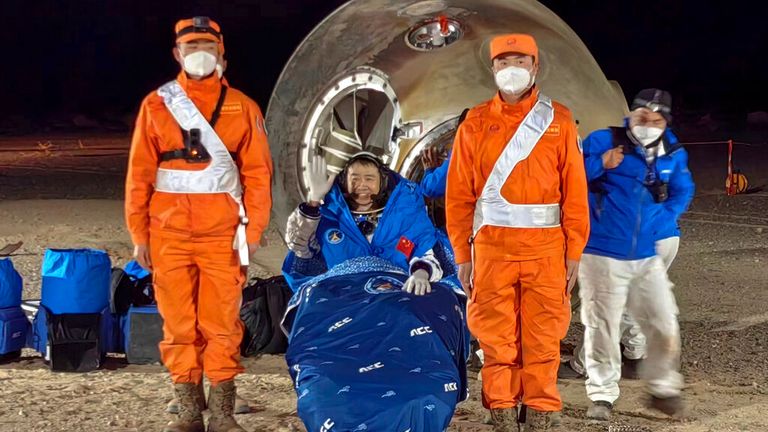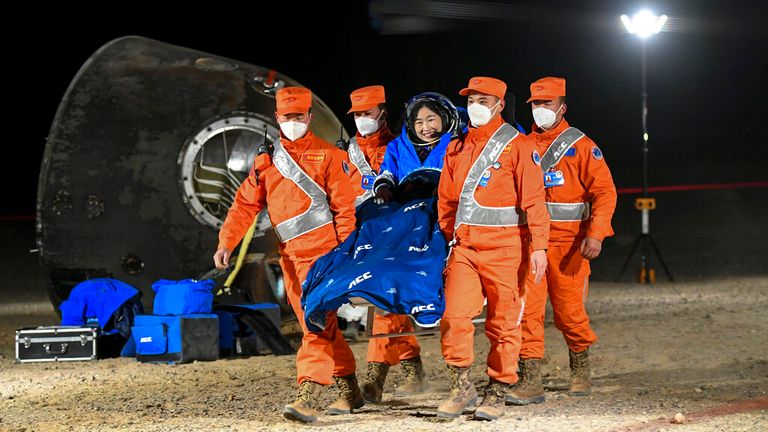SPACE RACE 2.0
Chinese astronauts land back on Earth after six-month missionCommander Chen Dong and astronauts Liu Yang and Cai Xuzhe touched down in a capsule at a landing site in the Gobi Desert in northern China at around 12.10pm, according to China Central Television.
Sunday 4 December 2022

Astronaut Chen Dong waves as he sits at the Dongfeng landing site in northern China
Three Chinese astronauts have landed back on Earth after six months spent completing construction of the Tiangong station, state TV reported.
Commander Chen Dong and astronauts Liu Yang and Cai Xuzhe touched down in a capsule at a landing site in the Gobi Desert in northern China at around 12.10pm, according to China Central Television.
Before departing, the astronauts overlapped their stay with three other colleagues who arrived on the Shenzhou-15 mission earlier this week for their own six-month stay.
It marked the first time China has had six astronauts in space at the same time.

Three Chinese astronauts have landed back on Earth after six months spent completing construction of the Tiangong station, state TV reported.
Commander Chen Dong and astronauts Liu Yang and Cai Xuzhe touched down in a capsule at a landing site in the Gobi Desert in northern China at around 12.10pm, according to China Central Television.
Before departing, the astronauts overlapped their stay with three other colleagues who arrived on the Shenzhou-15 mission earlier this week for their own six-month stay.
It marked the first time China has had six astronauts in space at the same time.

Ground crew checks on the astronauts inside the re-entry capsule
Medical workers carried the astronauts out of the capsule around 40 minutes after landing, and they appeared in high spirits as they waved happily at workers at the landing site.
Mr Chen, who was first to exit the capsule, said: "I am very fortunate to have witnessed the completion of the basic structure of the Chinese space station after six busy and fulfilling months in space.
"Like meteors, we returned to the embrace of the motherland."
Another of the astronauts, Ms Liu, recalled how moved she was to see relatives and colleagues.
The three astronauts have been part of the Shenzhou-14 mission, which launched in June.
During their time at Tiangong, the astronauts oversaw five rendezvous and dockings with various spacecraft, including one carrying the third of the station's three modules.
They also conducted a range of experiments, as well as performing three spacewalks.

Medical workers carried the astronauts out of the capsule around 40 minutes after landing, and they appeared in high spirits as they waved happily at workers at the landing site.
Mr Chen, who was first to exit the capsule, said: "I am very fortunate to have witnessed the completion of the basic structure of the Chinese space station after six busy and fulfilling months in space.
"Like meteors, we returned to the embrace of the motherland."
Another of the astronauts, Ms Liu, recalled how moved she was to see relatives and colleagues.
The three astronauts have been part of the Shenzhou-14 mission, which launched in June.
During their time at Tiangong, the astronauts oversaw five rendezvous and dockings with various spacecraft, including one carrying the third of the station's three modules.
They also conducted a range of experiments, as well as performing three spacewalks.

Astronaut Liu Yang is carried out of the capsule by medical workers
Tiangong is part of China's plans for a permanent human presence in orbit and represents a significant milestone in the country's three-decades-long manned space programme, first approved in 1992.
Weighing around 66 tonnes without attached spacecraft, it could one day be the only space station still up and running if the ISS retires by around the end of the decade as expected.
The astronauts returned to a country that has been gripped by protests in recent days, as patience runs out with the communist regime's strict COVID restrictions.
Lockdown rules have been eased in some cities as a result of the demonstrations.
Tiangong is part of China's plans for a permanent human presence in orbit and represents a significant milestone in the country's three-decades-long manned space programme, first approved in 1992.
Weighing around 66 tonnes without attached spacecraft, it could one day be the only space station still up and running if the ISS retires by around the end of the decade as expected.
The astronauts returned to a country that has been gripped by protests in recent days, as patience runs out with the communist regime's strict COVID restrictions.
Lockdown rules have been eased in some cities as a result of the demonstrations.
No comments:
Post a Comment